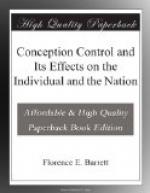The so-called advantages of a few years between one child and the next so that the parents may give fuller care and attention to each, are far outweighed from the child’s point of view by the advantages of playmates in the nursery of nearly its own age, who are a source of education in the give and take of life such as no adult can supply. If parents wish to have only three or four children, it is to the advantage of the mother as well as of the children, to have the little family early in life—they are then all in the nursery together, and later all at school, and her life work is in this way so arranged that she may give most service to the world in addition to carrying on the race.
Our conclusion is that for mothers and children it is very desirable that no contraceptives should be used in the early years of married life.
In the vast majority of families where no restrictions or unnatural means are used and where mothers nurse their children for eight or nine months, children only come every two years. Even if a young couple decide that they cannot afford to bring up more than four children, they have first to prove that four children will be given them—in many cases they will not have so many, and as years go by the fertility of the mother becomes progressively less, so that if child-bearing is postponed till after thirty, in a certain number of families no children are born. There are many men and women who bitterly regret having let the years go by in which children might have been born to them, and it is only fair that young couples of to-day should fully understand this risk.
CHAPTER III
METHODS
There are certain points in regard to methods of preventing conception which should be made clear.
It is, of course, obvious that conception can be voluntarily controlled by abstention from intercourse except when children are desired. This has been called a counsel of perfection. It could only rightly be so described where such a method of life was both desired and approved by both husband and wife. It would not be a fair thing for either to enforce a practically celibate life on the other without the fullest understanding and consent before the marriage vows were taken.
But conception can also be controlled by avoidance of those parts of the monthly cycle in which conception most commonly takes place. That in the great majority of women there is a time in the monthly cycle when no conception occurs has been noted for a long time. The rough-and-ready method of reckoning the date of birth in relations to the last menstrual period is an example of the assumption that conception will probably have taken place a week later, and the frequency with which such reckoning is justified shows that it is not altogether unfounded. During the war it was possible to make some more exact observations owing to the short leave granted to soldiers to visit




